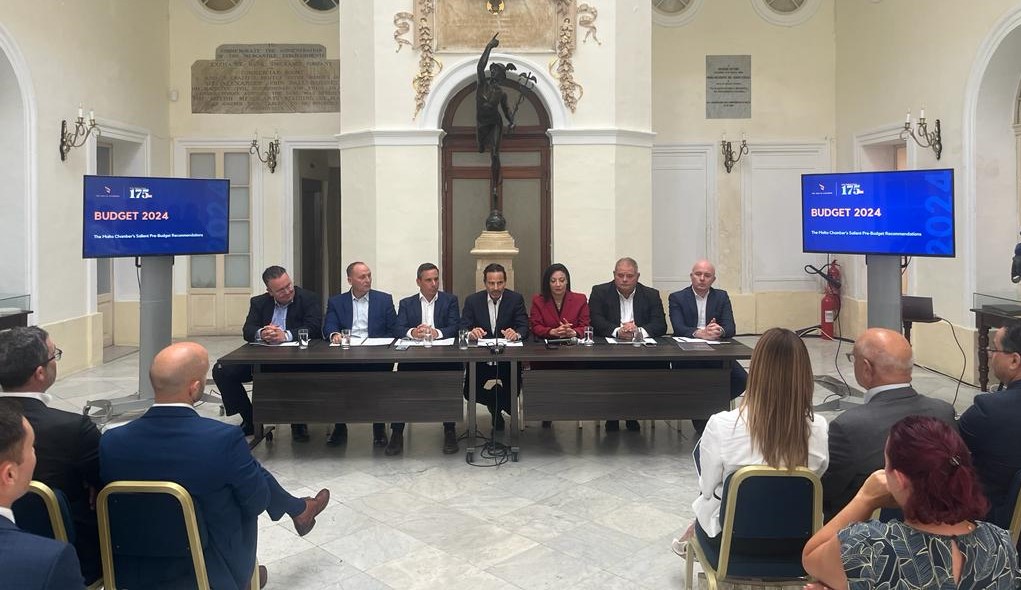The Malta Chamber has unveiled a wide-ranging set of pre-budget proposals with hundreds of points aimed at fostering “a smart and sustainable economy that promotes the well-being of its people and ensures that the country remains competitive and attractive for nationals and visitors alike.”
In a co-signed foreword, Chris Vassallo Cesareo and Marthese Portelli, president and CEO respectively, stated that the underlying message of this year’s budget “should not be based on continuity at all costs or simply more of the same.”
“This needs to be a budget that uses proper fiscal planning to set a new direction and clearly lays out how the necessary changes, reforms and initiatives are actually going to become a reality.”
The proposals put forward cover practically all sectors of the economy and wider society, from banking to transport, healthy living to justice reform.
The full document can be found here.
Below are some of the highlights of the lobby group’s pre-budget proposals, including attempts to address many of the long-standing issues affecting Malta’s businesses.
Energy
Education, energy frugality and sufficiency should take the place of generous energy subsidies, which should be gradually reduced while giving businesses and consumers adequate lead time to prepare for such reductions. Noting that the current levels of subsidies likely includes the subsidisation of excessive energy consumption, The Malta Chamber reaffirmed that units over and above the eco-reduction entitlement should not be subsidised with immediate effect.
To counter the likelihood of another meltdown in the energy distribution system, as occurred during a heatwave in July 2023, the lobby called for “substantially larger investment” in the network to ensure that key upgrades are completed by summer 2024.
COLA
The Malta Chamber argues that the current Cost of Living Adjustment (COLA) mechanism makes it “very likely” that inflation with remain high, making Malta’s exports including manufactured goods, tourism and financial services less competitive.
“Lower economic growth and higher wage costs will squeeze business margins. Employees are also paying more tax and moving into higher tax bands because of inflation and the resulting wage rises.”
To resolve this, it recommends a number of revisions to the tax system. First, to correct an anomaly in tax progression introduced along with the second 25 per cent tax band that has the effect of a very high marginal tax rate on pay rises that shift employees from the first to the second 25 per cent tax bracket. Second, to revise tax bands to compensate for the additional tax that will be paid on the COLA increases of 2023 and 2024. And third, to incorporate any planned tax refunds by cheque into the revised tax bands to eliminate the administrative burden of the issue of these cheques and to improve the monthly take-home pay of people in employment.
Eliminate half days
Half days are both inconvenient for businesses needing to deal with Government departments, especially particularly important ones like the Customs Department, and distort the labour market by disincentivising people from moving to the private sector, The Malta Chamber said, pointing out that “such a work cannot realistically be offered by businesses.”
Incentivise overtime
Taking up part-time work is so much more attractive than working overtime that businesses are finding it difficult to find anyone willing to work extra hours, said The Malta Chamber, pointing out that while overtime is taxed at 15 per cent for the first 100 hours, and thereafter at regular rates, part-time work is taxed at 10 per cent on the first €10,000. To make overtime work more attractive, it proposes extending the reduced tax rate to all overtime hours, not just the first 100 hours
Improve productivity
Noting that Malta only fulfilled half of its productivity growth potential between 2010 and 2022, The Malta Chamber called on Government to double its current expenditure on research and development, specifically in the government sector followed by the business sector and the higher education sector.
Concurrently, it called on Malta Enterprise to shift its focus from job-growth to increasing automation by changing the conditionality of the incentives it offers from the creation of new jobs to the improvement of productivity.
Shore up human resources
The Malta Chamber’s suggestions to improve the availability of human resources are numerous – unsurprising given the centrality of labour concerns to businesses over the last years. Here, proposals include allowing third country nationals (TCNs) to change employer freely once given a permit to live and work in Malta, and extending their employment licences for three years after the first year – but also introducing a cap on the percentage of TCNs for any enterprise’s total workforce, unless it is operating in healthcare or the provision of essential services such as waste management and public transport.
A crackdown on potential abuse by temping agencies is also recommended. This includes ensuring that a supposedly temporary employee working with the same company for over a year gets transferred to that company’s books, strict enforcement of licences, and actions against unauthorised recruitment brokers.
Hotels report strong 2024 so far, optimistic about a very busy summer
Trends are shifting in the preference for last-minute bookings, hotels say
Labour Party European Parliament manifesto: What’s in it for businesses?
Looking ahead, Prime Minister Robert Abela pledges new opportunities on the commercial and social sphere
WATCH: MEPs in dialogue – Enhancing Europe
The fourth in a series of debates designed to engage citizens in the lead-up to the MEP elections






